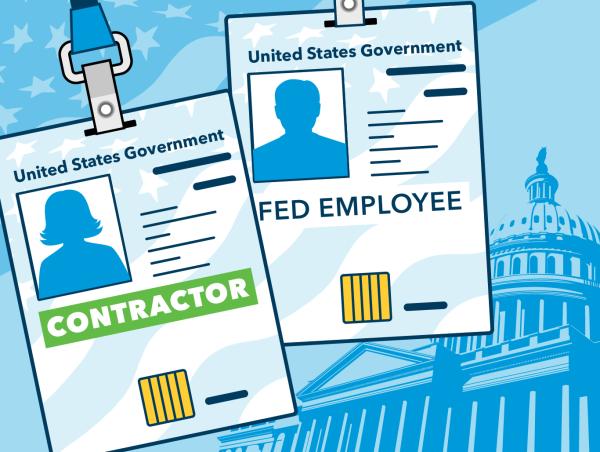Download this Report (acus.gov)
What role do contractors play in federal rulemaking?
Bridget C.E. Dooling (The George Washington University Regulatory Studies Center) and Rachel Augustine Potter (University of Virginia) prepared this report for the consideration of the Administrative Conference of the United States to help the independent agency make improvements to administrative processes and procedures.
"Contractors are us—they're feds—but in italics."
"To the extent that a contractor would be involved at all [in rulemaking], which in and of itself strikes me as highly irregular, I cannot think of an instance where such participation would be anything more than clerical or non-substantive."
Introduction
In agencies across the federal government, contractors have become a ubiquitous presence. Often working side-by-side with federal employees, contractors perform work that is both mundane and substantive, routine and highly specialized. Private sector contractors have performed services on behalf of the government since the Republic’s earliest days, but the scale and scope of government reliance on contractors has increased considerably in recent decades. This trend and its underpinnings are well-documented by scholars and oversight bodies, and the consequences for the government and for society are well theorized. Attention to the issue can be particularly acute on the heels of scandals, when a contractor or an agency has in some way crossed the public-private line. But in the day-to-day, contractors round out the federal workforce in important, if sometimes controversial, ways.
Little attention has been paid to the role of contractors in rulemaking. From a procurement perspective, this oversight is somewhat logical since contracts for rulemaking are relatively paltry when measured by the broader scale of federal procurement dollars; as one expert described it to us, “rules aren’t aircraft carriers.” And in the scant places where scholars have taken up the issue recently, they have raised hypothetical, but largely unsubstantiated, concerns about the extensive use of contractors in rulemaking. The general lack of attention to contractors in rulemaking has led some to the false impression that most or all rulemaking activities are “inherently governmental”—an important concept that we describe in detail below—and are therefore off-limits to contractors. However, this report establishes that contractors are used for a wide variety of rulemaking tasks, and sometimes extensively so.
This report explores the ways that federal agencies use contractors to support the rulemaking process. We begin with a discussion of the current academic literature on outsourcing for government services and then outline legal considerations that apply to rulemaking contracts in particular. Turning to a set of in-depth interviews with 45 agency officials, experts, and contractors and a survey of agency rulemaking officials, we next unpack agency perspectives on the appropriateness of contractors in rulemaking. We then provide an inventory of dozens of discrete tasks that contractors have performed in the rulemaking context. We also consider the reasons why agencies use (or do not use) contractors when writing rules. The next sections highlight agency practices for managing contractors in rulemaking and discuss other ways that agencies expand their capacity, beyond using contractors. We conclude with a set of proposed recommendations.
Our research reveals wide variation in how agencies approach the use of contractors in rulemaking. Not only do agencies have highly divergent attitudes about what contractors may and should do in rulemaking, they also perceive different risks and benefits of contractor use and manage contractors in different ways. What emerges is a complex picture, with contractors essential to rulemaking at some agencies, occasionally useful to a subset of agencies, and kept away from rulemaking at other agencies. Rulemaking differs from other functions that agencies perform in important and meaningful ways; the goal of this report is to draw a clear portrait of the contributions that contractors make in rulemaking, while also giving close consideration to the risks and challenges associated with using contractors in this space.
Before proceeding, we offer two caveats on the scope of this report. First, the regulatory process in the United States is expansive and, for the purposes of this report, we have limited the scope to the rule writing process within federal agencies. Typically, this process ranges from the data collection phase that precedes the publication of a proposed rule to the publication of a final rule in the Federal Register. This means that we generally exclude post-promulgation activities, such as enforcement.
Second, the research design we employ allows us to answer some questions better than others. The dearth of information about contractors in rulemaking—from both a data transparency perspective and a scholarly perspective—means that we began this project with little information about the extent to which contractors perform rulemaking tasks. The design we employ is qualitative, chronicling the roles that contractors take on in rulemaking, and any relevant issues associated with their use. Our research permits us to say clearly that some agencies use contractors for a variety of rulemaking tasks beyond what has previously been documented. It does not, however, allow us to answer questions about “most agencies” or “most contracting firms.” Our design, discussed in detail in Appendix A, followed a two-pronged approach: in- depth interviews and a survey. The interviews feature officials and experts, including 27 agency rulemaking officials from 6 agencies, 6 contractors, and 12 agency oversight officials and scholars with expertise in contracting and procurement. The interviews followed a non-random “snowball” recruitment strategy. The survey asked agency rulemaking contacts about contractor involvement in specific, recently-issued rules. Both prongs richly illustrate agency practices around contractors in rulemaking. Given this design, however, our research findings are not necessarily generalizable to rulemaking practices across the administrative state. We therefore eschew prevalence estimates, instead offering a descriptive summary that can serve as a roadmap for future exploration that builds on our core finding, which is that contractors have a significant presence in rulemaking.


